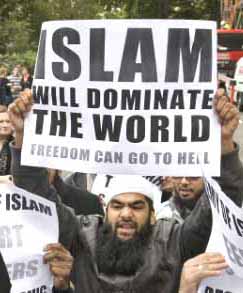There has definitely been an uptick in the last year; do Allah's gangsters see the weak, Islam-friendly President as encouragement to go ahead?
U.S. sees homegrown Muslim extremism as rising threat, Los Angeles Times, December 7, 2009Other quotes are surprisingly truthful as well:Europe had been the front line, the target of successive attacks and major plots, while the U.S. remained relatively calm. But the number, variety and scale of recent U.S. cases suggest 2009 has been the most dangerous year domestically since 2001, anti-terrorism experts said:
” There were major arrests of Americans accused of plotting with Al Qaeda and its allies, including an Afghan American charged in a New York bomb plot described as the most serious threat in this country since the Sept. 11 attacks.
” Authorities tracked other extremism suspects joining foreign networks, including Somali Americans going to the battlegrounds of their ancestral homeland and an Albanian American from Brooklyn who was arrested in Kosovo.
” The FBI rounded up homegrown terrorism suspects in Dallas, Detroit and Raleigh, N.C., saying that it had broken up plots targeting a synagogue, government buildings and military facilities.
Last week, Homeland Security Secretary Janet Napolitano issued her strongest public comments yet on the homegrown threat.
"We've seen an increased number of arrests here in the U.S. of individuals suspected of plotting terrorist attacks, or supporting terror groups abroad such as Al Qaeda," Napolitano said in a speech in New York. "Home-based terrorism is here. And, like violent extremism abroad, it will be part of the threat picture that we must now confront."
"You are seeing the full spectrum of the threats you face in terrorism," former Homeland Security Secretary Michael Chertoff said.However, the sensible idea of ending Muslim immigration does not appear."Radicalization is clearly happening in the U.S.," said Mitchell Silber, director of analysis for the Intelligence Division of the New York Police Department. "In years past, you couldn't say that about the U.S. You could say it about Europe." [...]
"People focused on the idea that we're different, we're better at integrating Muslims than Europe is," said Zeyno Baran, a scholar at the Hudson Institute, a think tank in Washington. "But there's radicalization — especially among converts [and] newcomers, such as the Somali case shows. I think young U.S. Muslims today are as prone to radicalization as Muslims in Europe." [...]
"You can be middle-class and have bright prospects but become a jihadist," [scholar Farhad Khosrokhavar] said. "We have to broaden the analysis. This idea of American exceptionalism, the comparison with Europe, should not blind us to the fact that we are going toward a broader participation in jihad."
 For years, the pro-immigration cheerleaders insisted that America did immigrant assimilation better than Europe, so there was no reason to fear Muslim immigrants turning into bombers. However, recent events have made that fable difficult to maintain, e.g. the Fort Hood Islam-inspired mass murder, the dozens of Somali residents of Minnesota returning home to wage jihad, and the arrests of Qaeda-connected terrorists (e.g. Najibullah Zazi).
For years, the pro-immigration cheerleaders insisted that America did immigrant assimilation better than Europe, so there was no reason to fear Muslim immigrants turning into bombers. However, recent events have made that fable difficult to maintain, e.g. the Fort Hood Islam-inspired mass murder, the dozens of Somali residents of Minnesota returning home to wage jihad, and the arrests of Qaeda-connected terrorists (e.g. Najibullah Zazi).